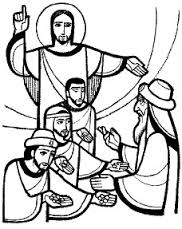14-16 November 2014
Prv 31:10-13, 19-20, 30-31; 1 Thes 5:1-6; Mt 25:14-30
As we approach the end of the liturgical year, the readings for Mass present themes based upon the questions of the last things of life, namely, death, judgement, our eternal reward in heaven or eternal damnation in hell.
The parable of the talents in its central message is truly full of joy. It is also a warning to believers of the importance of living each day to the fullest, by developing and using our abilities in complete correspondence with the daily gift of grace, so as to be prepared for the inevitable, but unpredictable day of the Lord.
The last servant who received a single talent and did nothing with it out of fear towards his master, failed to understand that by giving him a talent, the master wanted to make him into a friend, that the talent itself is a gift of communion with the master and also a sign of trust. Instead of taking the talent and making an effort to do something with it, even at the risk of losing it completely, he decided to do nothing and to return it to the master in the end. The servant lived in fear of his master, who here represents God, and in his heart developed a terrible image of him, I knew you were a demanding person… harvesting where you did not plant. What a terrible mistake it is to have a mistaken understanding of God! The Lord is constantly showing us through great and small signs, such as through a single talent he gives us, that he wants us to feel loved and appreciated by him. He is our friend who entrusts us with his gifts, which we are to use for our benefit and that of others. God is not interested in how much we will produce with our talents, but with what we will do with them. Specifically, it is a question of quality over quantity, whether we will produce good and beneficial results that will help us develop into better human beings, capable of great acts of charity.
The Lord surprises his servants by not taking back the talents he gave them. The first two servants did well in making use of the talents and making a double profit. The master doesn’t take the earnings away from them, but praises the fact that they were faithful in small matters and he rewards them by giving them great responsibilities. The Lord is not concerned about being paid back as much as he wants to encourage us to do well with the time and the talents that have been given to us. A great lesson can be found for us in this simple fact. We do not exist in order to give back to God what we have received from him. This would present a very limited and impoverished image of God, as calculating and demanding. We exist in order to become more like God, generous and talented in our own way by producing the good fruits of peace, liberty, justice and joy in life. These are the things that are of God, which he shares with us and enables us to become like him, sowers of life and eternity.
The world we live in and the life we have been given are gifts from God, which must grow, develop, mature and flourish in order to produce that which the Lord wishes to achieve through us. Though it may seem to us that God at times is far away or even absent, his prolonged absence is only a sign of his continuing trust in us. At the end of our lives we will not be judged by how much we have produced, but more so by the value of our service; not by the number of talents we have produced, but by the quality of their fruits.
There is a nice Hassidic saying that goes: ‘On that day, I will not be asked why I wasn’t like Moses or Elijah or one of the prophets. What I will be asked though, is why I didn’t become who I am’. If God wanted you to be Moses or Elijah or even one of the New Testament disciples, he would have created you a long time ago. Instead, God has made you who you are, and he expects you to be faithful to yourself and your identity, by becoming His son or daughter, a worthy servant of life, true to the vocation God has given to you.
Nobody is without talents. This is a law of creation, for God does not create uselessly. Even though we may think we don’t have much to offer, the little we possess can mean a lot for others. God doesn’t want you to save the world. That is his job and he has already done this in Jesus Christ his Son. God wants you to be his faithful friend by demonstrating that you are trustworthy and capable of being faithful in small matters. By doing so, you become a talent to yourself and the good of others. Each of us can be considered a talent from God destined for one another. I have received you as my talent, my personal gift, which I now have to take care of, nurture and further develop. It is as if God were saying to each of us: ‘You are my talent and I have made you into a talent for others and they shall be like a talent to you’. Our lives are intertwined with that of our Father in heaven, who is gathering us together not as his servants but as his trustworthy friends, who do their best to remain faithful in small matters.



